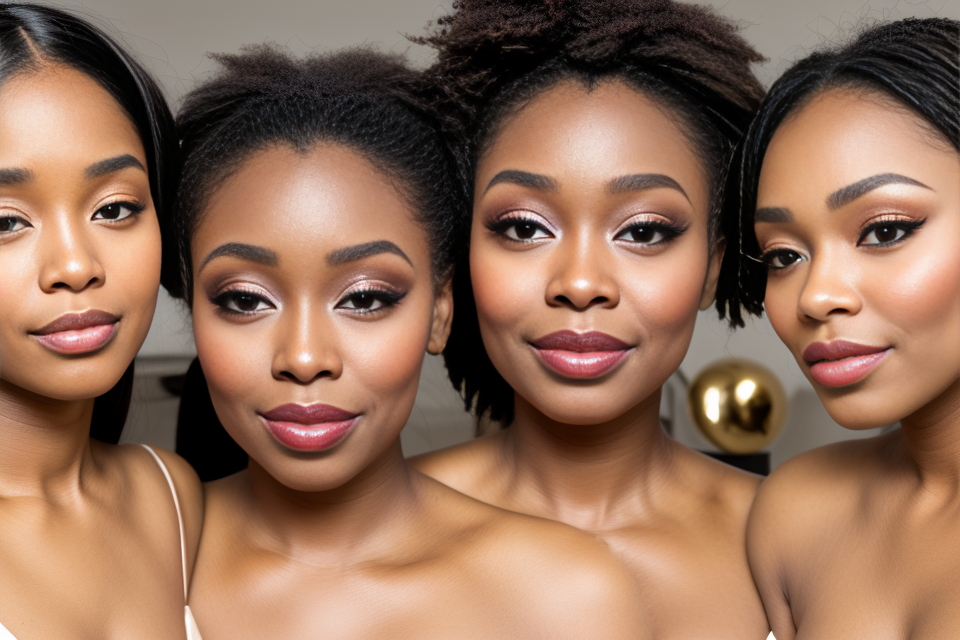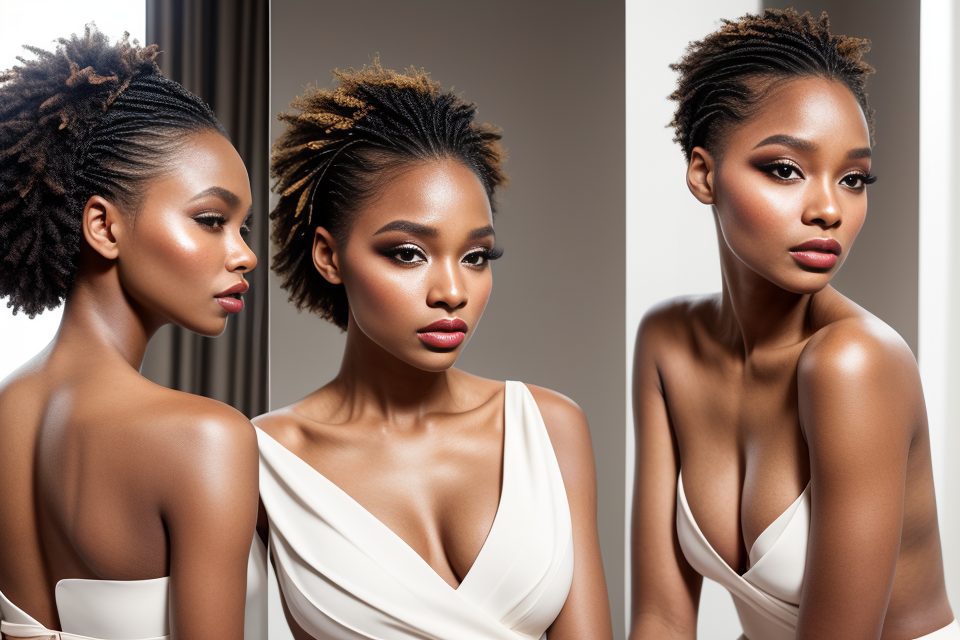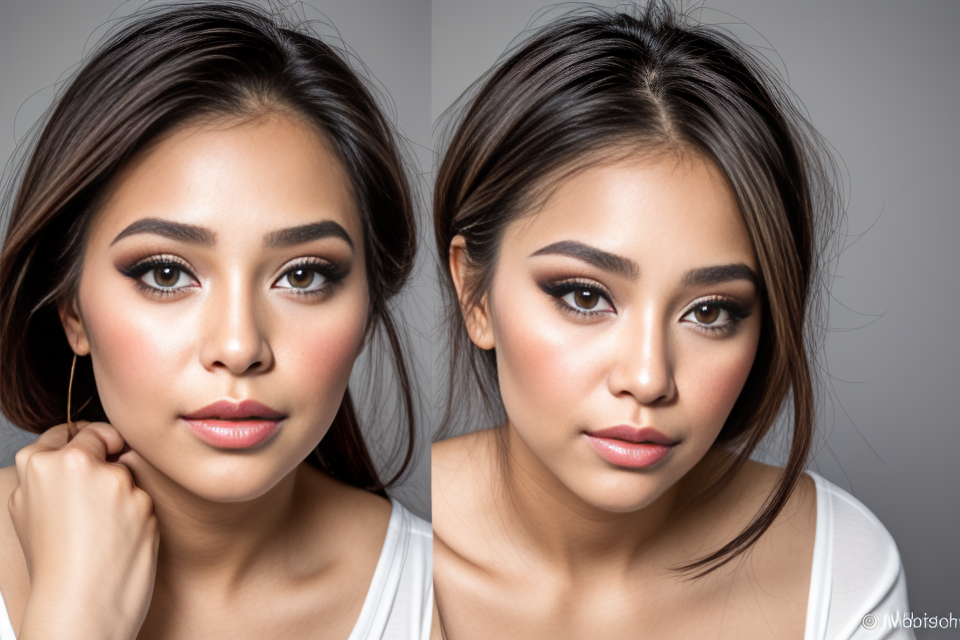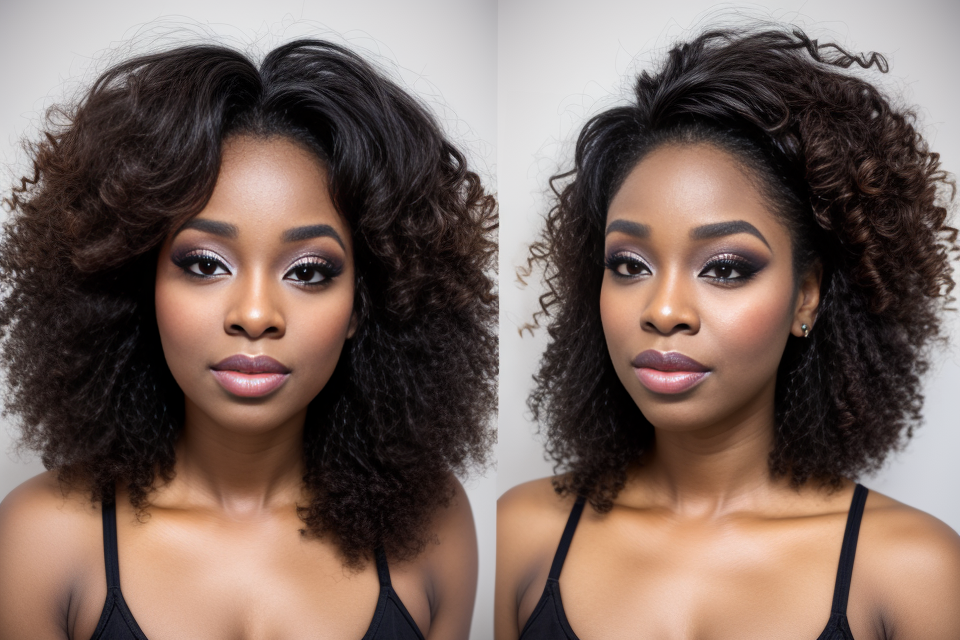Choosing the right makeup for your skin tone can be a daunting task, especially if you have deep skin. With so many shades and colors to choose from, it can be overwhelming to find the perfect match. But don’t worry, we’ve got you covered! In this article, we’ll guide you through the process of selecting the right makeup for your deep skin tone. From understanding your undertone to selecting the right foundation, we’ll provide you with all the tips and tricks you need to achieve a flawless look. So, get ready to say goodbye to your makeup woes and hello to a stunning, radiant you!
Understanding Deep Skin Tones
Characteristics of Deep Skin Tones
Deep skin tones are often characterized by an abundance of melanin, which gives the skin its rich, deep color. This type of skin tone is commonly found in individuals with African, Asian, and Middle Eastern descent. One of the key characteristics of deep skin tones is the presence of a yellow or golden undertone. This undertone can affect the way that certain colors look on the skin, and can impact the overall appearance of the makeup. It is important to understand these characteristics when choosing the right makeup for deep skin tones.
Common Misconceptions
When it comes to choosing the right makeup for deep skin tones, there are several common misconceptions that need to be addressed. Here are some of the most common ones:
- Deep skin tones are not “too dark” to wear certain colors: One of the biggest misconceptions about deep skin tones is that they are limited to certain colors. However, this is simply not true. People with deep skin tones can wear a wide range of colors, from bold and vibrant shades to more muted and neutral tones. The key is to find the right undertone match for your skin.
- Anyone can wear any color, as long as the correct undertone is matched: While it is true that anyone can wear any color, it is important to consider your undertone when choosing makeup. Undertones are the colorful or grayish-brownish cast to your skin, which can be warm, cool or neutral. If you have a warm undertone, you will look best in warm-toned colors like reds, oranges, and yellows. If you have a cool undertone, you will look best in cool-toned colors like blues, purples, and greens. If you have a neutral undertone, you can wear any color.
Identifying Your Undertone
How to Determine Your Undertone
Identifying your undertone is the first step in choosing the right makeup for your deep skin tone. Here’s how you can determine your undertone:
- Look at the veins on your wrist or inner elbow:
- If they appear green, you have a warm undertone.
- If they appear blue or purple, you have a cool undertone.
- If they appear yellow or gold, you have a neutral undertone.
By identifying your undertone, you can select makeup products that will complement your skin tone and enhance your natural beauty. Keep in mind that this method is not foolproof, and you may need to experiment with different products to find the best match for your skin. Additionally, your undertone may change depending on factors such as the time of day, the lighting, and your health and lifestyle. Therefore, it’s essential to choose makeup that can adapt to different situations and enhance your skin’s natural radiance.
Importance of Undertone
- Determines which colors will look best on you
- Impacts the way certain makeup products appear on your skin
Understanding your undertone is crucial when it comes to choosing the right makeup for your deep skin tone. Your undertone is the color that appears beneath the surface of your skin, and it can greatly impact the way that your makeup looks on you. By determining your undertone, you can select the colors that will flatter your skin and enhance your natural beauty.
One of the most important aspects of determining your undertone is understanding how it affects the way that different makeup products will look on your skin. For example, if you have a warm undertone, warm-toned makeup colors will look best on you, while cool-toned makeup colors may wash you out. On the other hand, if you have a cool undertone, cool-toned makeup colors will look best on you, while warm-toned makeup colors may not suit you as well.
By taking the time to identify your undertone, you can ensure that you are choosing the right makeup for your deep skin tone. This will help you to look your best and feel confident in your appearance. So, how do you determine your undertone? Keep reading to find out!
Finding the Right Foundation
Importance of Foundation
Foundation is a crucial element in any makeup routine, especially for those with deep skin tones. It serves as the base of your makeup look and is responsible for creating a flawless and even-toned complexion. The right foundation can help to cancel out imperfections, such as blemishes and redness, and provide a natural-looking finish that complements your skin tone.
When choosing a foundation, it’s important to consider the following factors:
- Skin tone: Look for a foundation that closely matches your skin tone, avoiding shades that are too light or too dark.
- Coverage: Decide whether you want a light, medium, or full coverage foundation, depending on your skin type and the level of coverage you desire.
- Formula: Choose a formula that is comfortable to wear, long-lasting, and won’t clog your pores.
- Finish: Select a finish that suits your preferences, whether it’s a natural, matte finish or a radiant, dewy finish.
By taking these factors into account, you can find a foundation that perfectly complements your deep skin tone and enhances your natural beauty.
Choosing the Right Shade
When it comes to choosing the right foundation for your deep skin tone, selecting the right shade is crucial. Here are some tips to help you find the perfect match:
- Match your foundation to your jawline or neck: The best way to determine your foundation shade is to match it to the color of your jawline or neck. This method works because the neck is usually the same color as the face, but it’s less likely to have as much sun exposure, making it a more accurate representation of your natural skin tone.
- Look for a shade that closely matches your skin tone: A good rule of thumb is to choose a foundation that is one shade lighter than your natural skin tone. This will help you achieve a more natural look without looking too dark or too light.
- Test out different shades on your hand before applying to your face: Before you commit to a foundation shade, it’s always a good idea to test it out first. Dab a small amount of the foundation on the back of your hand and compare it to your skin tone. If the color looks too dark or too light, you may need to try a different shade.
By following these tips, you can find the perfect foundation shade for your deep skin tone and achieve a flawless, natural-looking complexion.
Choosing the Right Concealer
Importance of Concealer
- Concealer is a versatile makeup product that is used to cover blemishes and under-eye circles. It is an essential tool for anyone looking to achieve a flawless complexion.
- In addition to its primary function, concealer can also be used to brighten up the under-eye area. This is especially useful for those who struggle with dark circles or puffiness in this area.
- The right concealer can help to even out skin tone, reduce the appearance of pores, and create a more radiant, youthful look.
- When choosing a concealer, it is important to consider your skin type and the specific concerns you want to address. Different formulations and shades will work better for different skin tones and issues.
-
Additionally, the texture of the concealer is also important. A good concealer should have a creamy, blendable texture that applies smoothly and does not cake or settle into fine lines.
-
Consider your undertone
- Warm undertones have yellow or golden undertones
- Cool undertones have pink or pink-red undertones
- Neutral undertones have a neutral or slightly yellow undertone
- Match your concealer to your foundation shade
- This will help to create a seamless and natural look
- Apply a small amount to the area you want to cover and blend
- This will help to cover any blemishes or imperfections while still looking like natural skin.
Choosing the Right Powder
Importance of Powder
When it comes to choosing the right makeup for deep skin tones, powder is an essential component that should not be overlooked. Here are some reasons why powder is important for deep skin tones:
- Powder sets your makeup and helps to prevent creasing
Powder is a great way to set your makeup and ensure that it lasts throughout the day. It helps to create a matte finish and prevent creasing, which can occur when oil and sweat accumulate on the skin. This is especially important for deep skin tones, as they tend to be more prone to creasing and fading throughout the day.
- Can also be used to control oil and shine throughout the day
In addition to setting your makeup, powder can also be used to control oil and shine throughout the day. This is especially important for deep skin tones, as they tend to produce more oil and be more prone to shine. By using a powder with a matte finish, you can help to reduce the appearance of oil and shine, giving you a more natural and long-lasting look.
Overall, powder is an essential component of any makeup routine for deep skin tones. By using a high-quality powder, you can set your makeup, prevent creasing, and control oil and shine throughout the day.
When it comes to choosing the right powder for your deep skin tone, selecting the right shade is crucial. Here are some tips to help you make the right choice:
- Match your powder to your foundation shade: The shade of your powder should match the shade of your foundation. This will ensure that your makeup looks seamless and natural.
- Look for a powder that will not accentuate your skin’s natural oil or texture: Powders that are too light or too dark can accentuate your skin’s natural oil or texture, which can make your skin look oily or uneven. To avoid this, look for a powder that is specifically formulated for deep skin tones. This will help to minimize the appearance of pores and imperfections, while still providing adequate coverage.
By following these tips, you can ensure that you choose the right powder for your deep skin tone, which will help you achieve a flawless and natural look.
Choosing the Right Blush
Importance of Blush
Blush is an essential makeup product that can greatly enhance the appearance of deep skin tones. Here are some reasons why blush is important for deep skin tones:
- Adds a healthy glow to the cheeks: Blush can give the skin a natural-looking flush, which can help to create a healthy and youthful appearance. For deep skin tones, it’s important to choose a blush that complements the skin’s natural undertone, whether it’s warm, cool, or neutral.
- Can also be used to contour the face: In addition to adding color to the cheeks, blush can also be used to contour the face by adding depth and dimension to the cheekbones. This can help to create a more sculpted and defined look, which can be especially flattering for deep skin tones.
When choosing a blush for deep skin tones, it’s important to consider the color and finish of the product. A blush with a warm or golden undertone will typically work best for deep skin tones, as it can help to warm up the complexion and create a healthy glow. Additionally, a cream or powder finish can provide a natural and long-lasting effect.
When it comes to choosing the right blush for your deep skin tone, it’s important to consider a few key factors. Here are some tips to help you find the perfect shade for your skin:
- Match your blush to your skin tone: The best way to choose a blush is to match it to your skin tone. Look for a blush that complements your natural coloring and doesn’t clash with your skin.
- Look for a blush that will not wash you out or overpower your skin tone: When choosing a blush, it’s important to find one that will enhance your natural beauty without overpowering it. Avoid blushes that are too light or too dark for your skin tone, as they can make you look washed out or unnatural.
- Consider the undertone of your skin: The undertone of your skin can affect the color of the blush that looks best on you. If you have warm undertones, look for blushes with warm undertones like pink or golden hues. If you have cool undertones, look for blushes with cool undertones like purple or blue-based hues.
- Choose a blush with good pigmentation: A good blush should have good pigmentation, meaning it should be highly pigmented and go on smoothly without being chalky or streaky. This will ensure that your blush lasts all day and looks natural.
- Test out different shades: Finally, don’t be afraid to experiment with different shades of blush until you find the one that works best for you. Visit a makeup counter and ask for samples to test out different shades on your skin. This will help you find the perfect blush for your deep skin tone.
Choosing the Right Eyeshadow
Importance of Eyeshadow
Eyeshadow is a crucial component of any makeup routine, and it is especially important for those with deep skin tones. Here are some reasons why:
- Adds depth and dimension to the eyes: Eyeshadow can create a sense of depth and dimension to the eyes, making them appear more alive and expressive. This is especially important for those with deep skin tones, as it can help to balance out the warm undertones of the skin.
- Creates a specific look or style: Eyeshadow can be used to create a specific look or style, whether it be a subtle, natural look or a bold, dramatic one. With so many different shades and finishes available, there is a eyeshadow for every occasion and every skin tone.
It is important to note that when choosing eyeshadow, it is essential to consider the undertone of the product. Those with deep skin tones should look for eyeshadows with cool or neutral undertones, as these will complement the natural warmth of the skin. Avoid using eyeshadows with warm undertones, as they can make the skin appear even more ruddy and unbalanced.
When it comes to choosing the right eyeshadow for your deep skin tone, there are a few key things to keep in mind. First and foremost, you’ll want to make sure that you’re selecting a shade that will complement your skin tone and undertone.
To do this, you can start by looking at the undertone of your skin. If you have a warm undertone, look for eyeshadows with warm, golden, or peachy undertones. If you have a cool undertone, look for eyeshadows with cool, silver, or blue undertones.
It’s also important to consider your eye color when choosing an eyeshadow. For example, if you have brown eyes, you may want to opt for a neutral or warm-toned eyeshadow to bring out the warmth in your eyes. If you have blue eyes, on the other hand, you may want to opt for a cool-toned eyeshadow to complement your eye color.
Another factor to consider when choosing an eyeshadow is the depth of your skin tone. If you have deep skin, you may want to avoid using too much shimmer or glitter in your eyeshadow, as this can overwhelm your skin and make it look even darker. Instead, opt for a matte or satin finish that will enhance your skin without overpowering it.
When you’re shopping for eyeshadows, it’s a good idea to test out a few different shades on your skin to see which ones look best. You can also ask a friend or family member for their opinion, as they may be able to provide a fresh perspective.
Ultimately, the key to choosing the right eyeshadow for your deep skin tone is to find a shade that complements your skin and undertone, and that enhances your natural beauty without overpowering it.
FAQs
1. What is a deep skin tone?
A deep skin tone refers to a complexion that appears darker than average, with warm or golden undertones. This skin type can have a range of shades from light to dark brown, and can have a tendency to be more oily or prone to acne.
2. How do I know my skin tone?
The best way to determine your skin tone is to look at the veins on your wrist. If your veins appear green, you have a warm undertone, while if they appear blue or purple, you have a cool undertone. If you can’t tell, you can also check the color of your teeth and the inside of your mouth. If they appear yellow or orange, you have a warm undertone, while if they appear pink or red, you have a cool undertone.
3. What are the best makeup colors for deep skin tones?
Deep skin tones can wear a wide range of colors, but the best options are those with warm undertones, such as golden, bronzy, and peachy shades. Avoid colors with cool undertones, like silver, gray, and pink, as they can wash out your complexion.
4. How can I make my makeup look more natural on deep skin tones?
To make your makeup look more natural on deep skin tones, use lighter, more subtle shades and focus on enhancing your features rather than covering them up. Use a small amount of foundation to even out your skin tone, and use a powder with a yellow or golden undertone to set your makeup and add warmth to your complexion.
5. How can I avoid making my deep skin tone look ashy?
To avoid making your deep skin tone look ashy, avoid using colors with blue or purple undertones, as they can make your skin appear dull and gray. Instead, opt for shades with warm undertones, like peach, bronzy, and golden hues. Additionally, be sure to use a setting powder with a yellow or golden undertone to add warmth and luminosity to your skin.



